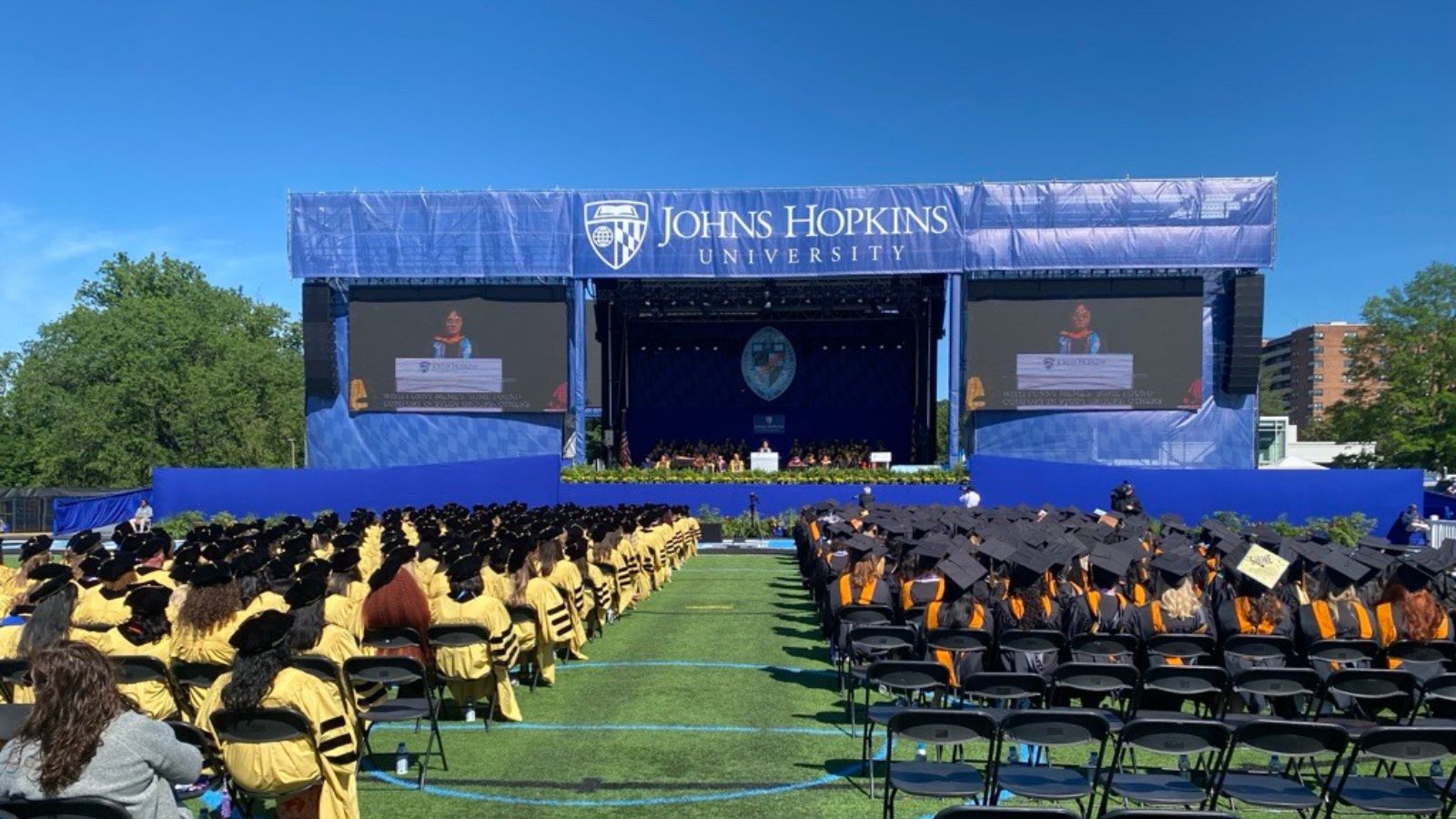Dain Choi, a graduate of the MSN (Entry Into Nursing) Program, addressed the students at the 2025 Commencement ceremony.
Good morning, Johns Hopkins Graduate students, family, friends, faculty, and staff. My name is Dain Choi, and it is an honor and privilege to be your student speaker today.
Let’s take a moment to fully embrace the joy and relief of finally completing this program. It has been a wild journey with long nights spent finishing assignments, endless group projects, and, of course, unforgettable moments like joining the 5K Marian Marathon and watching Dean Szanton outrun me. That was definitely a highlight, and I can only aspire to match her vitality.
From the moment we began our programs, we knew we were stepping into something greater than ourselves. Yet, nothing prepared us for the sheer volume of knowledge we absorbed. We filled every whiteboard with notes, downed too many energy drinks, kept each other sane with funny memes and
having group chat conversations like “Did anyone finish this IPOC?”. Some found comfort in study groups; others stress bought more nursing gear. But no matter how we got through—it was together. And now, here we are, earning our place in one of the most prestigious schools in the country.
As we step into the roles we are passionate about, I want us to pause and ask ourselves— what does the message we’ve received through our training mean for us now? For those of us entering as MSN (Entry into Nursing) graduates, stepping into the profession as registered nurses, it’s a call to embrace not just the technical skills but the art of compassionate care. It’s about offering patients not only expertise but also a genuine connection and respect for their experiences. It’s our duty to make every patient feel seen and heard, especially during vulnerable moments. Even when they refuse their meds… again.. For the third time.
For our MSN specialty and post-degree certificate recipients, expanding their expertise means assuming leadership roles with an eye toward innovation in clinical practice. It’s a call to challenge the status quo and implement change that elevates patient care. With the ability to lead teams, influence healthcare policy, and provide specialized care, you’re poised to make a real difference in addressing complex health challenges.
For our DNP and PhD graduates, you’re not just completing a degree—you’re stepping into the forefront of change. Your journey is about using knowledge to transform systems, shape policy, and build bridges in healthcare. Whether you’re in the lab, leading quality initiatives, or advocating for underserved populations, your work centers on impact. You now carry both the responsibility and the privilege of making healthcare more just, more accessible, and more human—for everyone.
The pledge we took is not just a promise—it’s a lifelong commitment. Walking through the Nursing School lobby, I often reflect on this reminder: Practice cultural humility, treat each person with respect, and listen so that I may give voice to the voiceless.
I look at each graduate here today and see the future of healthcare. I see hospitals, clinics, and communities transformed by our commitment. I see us championing diversity, equity, and
inclusion as guiding principles. I see us reaching those who feel voiceless and standing up for them, regardless of gender, identity, or background. We are positioned to create change—through
meaningful patient interactions, through advancing support for those silently navigating mental illness, and through the choices we make to advocate for better care.
I want us to remember that our journey does not stop here. The pledge we all took is not the end of our training but the start of our purpose. In other words, you thought it was sweet once we got our degrees, but no… keep pushing boundaries… Refuse to accept the status quo as unchangeable… Look ahead and reflect on how your choices today can help build the healthcare system we all envision for the future.
For me, that means advocating for equitable healthcare access and strengthening trust between providers and patients. For you, it might be transforming bedside care, publishing game-changing research, or finally explaining to your family that, yes, you really can do more than just take blood pressure. Whatever it is—pursue it with purpose. I want to leave you with advice that has resonated with me since my elementary school days: “Everybody can be great… because anybody can serve.” — Dr. Martin Luther King Jr. This powerful mantra has guided me through challenges and triumphs alike. Remember, it’s not about perfection but about giving your all in every endeavor.
Congratulations, Class of 2025. May you all be a light of hope for those entrusted in your care.
